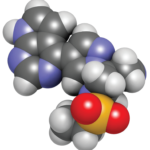(Reuters)—An experimental rheumatoid arthritis drug developed by Eli Lilly and Co. and Incyte Corp. poses serious risks of deadly blood clots at higher doses, U.S. Food and Drug Administration staff says, the latest setback to a treatment regulators declined to approve last year.
New data provided by the companies in a resubmission of their marketing application did not substantially alter information from the original, the staffers note.
Shares of Lilly and Incyte were marginally down in early trading.
“At this point, approval in the U.S. is in jeopardy,” Hilliard Lyons analyst Kurt Kemper tells Reuters, adding that the review was much harsher than he had expected.
Safety data supported a lower 2 mg dose of the drug, baricitinib, but not a 4 mg dose, raising questions whether the higher dose provides additional benefit, the staffers say.
Also, the limited data available on the lower dose complicates the assessment of its risk/benefit analysis, the staffers add.
Evercore ISI analyst Josh Schimmer says questions over the doses could result in an awkward label for the drug.
Lilly and Incyte hope to launch baricitinib, a potential blockbuster, in the huge, competitive market for rheumatoid arthritis treatments, currently dominated by AbbVie’s Humira, the world’s top-selling prescription medicine.
Baricitinib is a once-daily pill that belongs to a class of drugs known as JAK inhibitors, which work by blocking inflammation-causing enzymes known as Janus kinases.
Ahead of Thursday’s assessment, experts were concerned that the review of baricitinib was likely to weigh on other companies with oral JAK inhibitors in their pipeline.
However, agency staffers noted that the risk of thrombosis, or blood clotting, appeared unique to baricitinib and had not been observed in other therapies, especially Pfizer Inc’s already approved Xeljanz.
“This could be a positive for competitors such as AbbVie and Gilead and Galapagos that have their own oral JAK inhibitors in late-stage development,” write Credit Suisse analysts.
The confusion over doses could also benefit AbbVie’s experimental drug upadacitinib, Evercore ISI’s Schimmer says.
All eyes are now on Monday’s advisory committee (Adcom) meeting when an independent panel of experts is scheduled to evaluate baricitinib based on data from the companies and the analysis by FDA staff.
The health regulator is not mandated to follow the panel’s recommendations, but usually does.
However, BMO Capital Markets analyst Alex Arfaei was not optimistic.
“We doubt the Adcom will alleviate the FDA’s safety concerns since they typically take a conservative approach, particularly when there is not a dire unmet need,” he writes in a note to clients.


